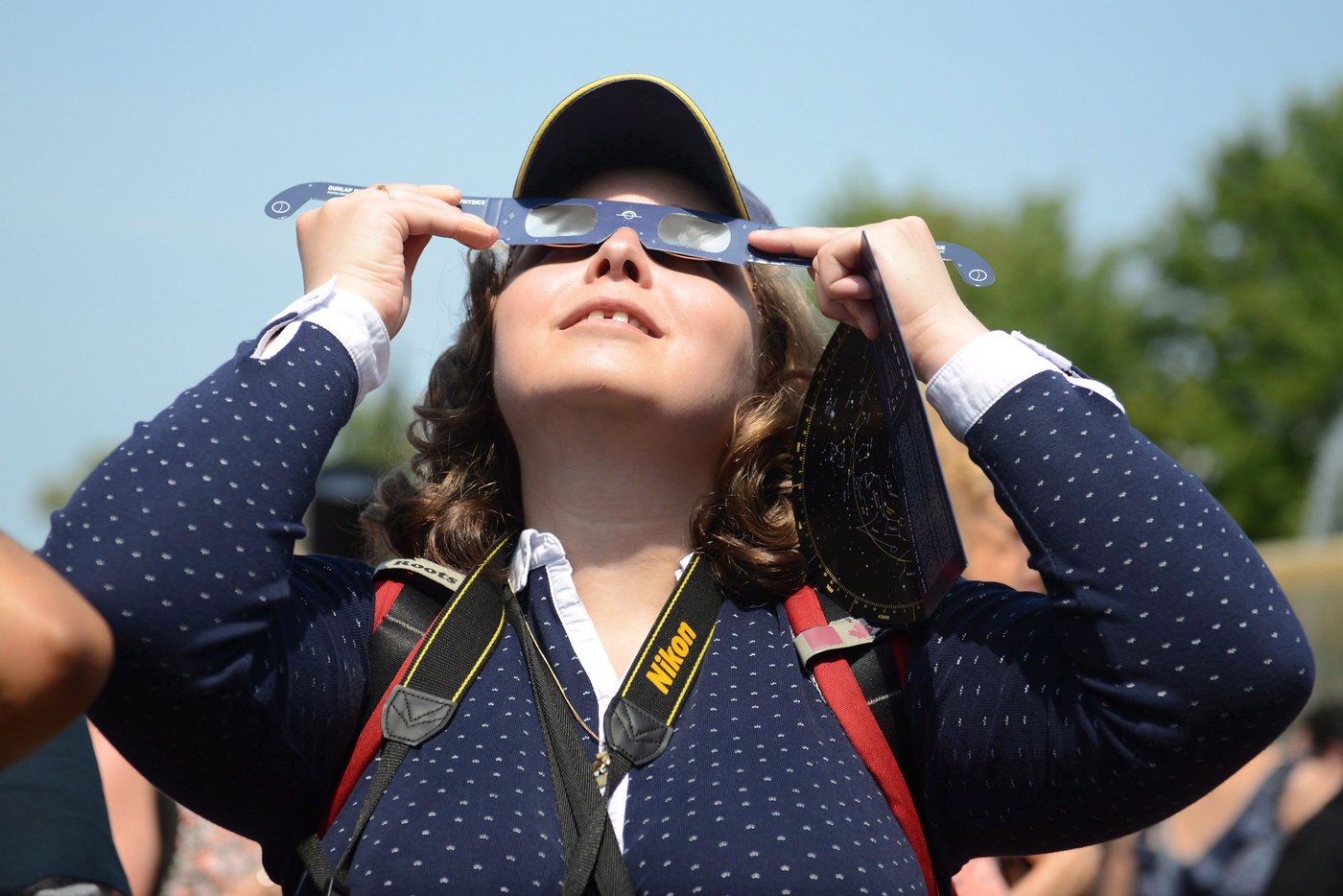
Toronto school board voting on whether to cancel classes on day of solar eclipse, citing safety concerns
January 31, 2024
By
The Canadian Press

Canada’s largest school board is voting Wednesday on whether it should revise its school calendar so students can stay home on the day a rare solar eclipse will partially and, for a fleeting few minutes in some areas, totally dim daylight. Observers watch a solar eclipse at the Canadian National Exhibition in Toronto on Monday, August 21, 2017. THE CANADIAN PRESS/Jon Blacker
By Fakiha Baig in Toronto
Canada’s largest school board is voting Wednesday on whether it should revise its school calendar so students can stay home on the day a rare solar eclipse will chart a course through parts of Canada.
If the Toronto District School Board votes in favour of the revision, it will join at least six other Ontario school boards, as well as two school service centres in Quebec, that have already notified parents classes are cancelled on April 8 in preparation for the celestial event.
“Looking directly at the sun during the eclipse, without appropriate protection, can lead to serious problems such as partial or complete loss of eyesight,” TDSB staff state in a document that outlines the agenda of Wednesday night’s board meeting.
“There are also traffic related safety concerns as thousands of children would be returning home at the end of the day in temporary darkness … Out of an abundance of caution, staff is recommending that the Board move the (professional activity) day scheduled for April 19, 2024 to April 8, 2024.”
“There is no significant impact in changing the date,” it added.
School boards in the Greater Toronto Area, like ones in the Peel, Durham, and Halton regions, have already made the change, the document noted. The other boards have moved a previously scheduled professional activity day to April 8.
The eclipse is expected to be observed in Mexico first at around 11:07 a.m. PDT, when the moon will move in between Earth and the sun, casting a partial or total shadow on the “lucky humans” who are able to observe the moment, said Elaina Hyde, a professor of physics and astronomy at York University in Toronto.
The eclipse will then be visible in the United States before moving toward southern Ontario, then Quebec, New Brunswick, Prince Edward Island, and Nova Scotia’s Cape Breton, lasting for about two hours around the same time many kids in Canada are let out from school.
“It’s got a curved path and everyone’s very excited for it,” said Hyde, who is also the director of the York Allan I Carswell Observatory. “Even those of us who study astronomy for a living still have not seen a total solar eclipse, so fingers crossed.”
The partial eclipse is set to cast its shadow in several parts of southern Ontario, Hyde said, while observers in the Ontario communities of Niagara Falls, Hamilton, and Grimsby specifically can expect total darkness for about four minutes some time between 2 p.m. to 4 p.m. EDT.
Given how rare the celestial event is, Hyde said precautions need to be taken, particularly with children, that include not looking directly at the eclipse.
Canadian school boards that are rescheduling personal activity days to keep children home are making the right decision, she said.
“The big danger with this event is, of course, that a lot of people will be trying to look up at the sun, which is incredibly hazardous to your eyes. You can literally go blind,” said Hyde.
“The pure intensity of the light that will be coming out of the sun will be enough to permanently damage the sensitive materials inside your eye and it’s not worth (the) damage.”
Dr. Mélissa Généreux, a spokesperson with Estrie Public Health, which represents Quebec’s Eastern Townships region where the eclipse is set to cast a shadow, said authorities are leaving the choice of whether to close or not up to individual schools.
However, she said they are stressing the need for adequate adult supervision to ensure children are viewing the eclipse safely — including on school buses.
She said those guidelines include making sure children are wearing protective glasses or viewing the event indirectly through the use of “eclipse boxes,” and keeping a particular eye on those who struggle to follow directions.
“Can we really ensure the safety of all the children where there aren’t any adults in the bus who are supervising and telling them not to look, or to only look with glasses?” she said in an interview.
Hyde said parents can take the opportunity of such a unique day in April to teach their children about astronomy.
“It’s a great chance for people to have the day off, enjoy something that will definitely not be near again for another 100 years,” she said.
“This is a very unusual event for the skies in general. You have to be in exactly the right place, at exactly the right time.”
In New Brunswick, the province said that schools may have an early dismissal time to allow students to safely arrive at their destinations before the eclipse begins.
“The department has communicated this with districts, and they will be sharing further details with families,” Judy Désalliers, a communications officer with the Department of Education and Early Childhood Development, wrote in a statement.
“This phenomenon will be presented as an authentic learning opportunity in New Brunswick and we are fortunate to have partners and experts to make this experience more rewarding and safe.”
– with files from Morgan Lowrie in Montreal and Hina Alam in Fredericton.